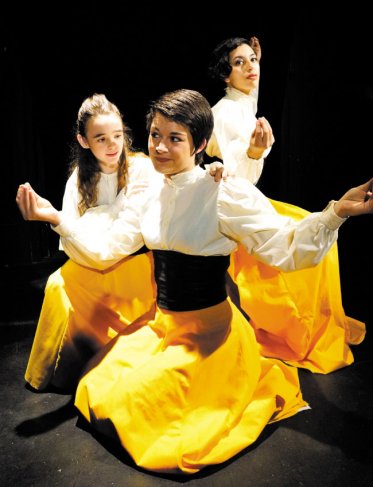What Can You Take With You?
You Can’t Take It With You is rife with fluffy, feel-good absurdity.
But behind all the basement fireworks explosions, the Baby Huey housewife’s ballerina twirling, a slew of oddball strangers incessantly fumbling through the house, a mom with a penchant for sexual innuendo and a grandpa who’s obliviously upbeat despite an audit by the IRS ― beneath all that, there’s a message. It’s the kind of message the progeny of an eccentric family ― and who doesn’t have an eccentric family? ― would spin into a show, the show that’s currently playing at HPU’s Paul and Vi Loo Theatre.
mw-art-040815-kaiulani
When said family finds itself interacting with a highly respected, socially “normal” family, expected issues arise, which include revelations that every normal person has their own inner quirkiness, and that sometimes veering off the worn path offers a more adventurous, worthy life. Finances and career? Phooey. The play posits that real richness comes from celebrating those crazy people we call family.
Speaking of family, after 23 years as HPU theatre’s grand matriarch, guiding a stream of both novice college actors and seasoned regulars through 50 productions as resident director, this production is Joyce Maltby’s bittersweet farewell to HPU theatre. It bears the Maltby hallmark of exceptional entertainment that has been drawing audiences to the Kaneohe campus these past couple of decades. Her shows bear a well-honed quality with steady pacing and well-developed characters.
You’ll recognize some HPU regulars in You Can’t Take It With You, including Maltby’s daughters Melinda and Becky, HPU theater teacher Larry Bialock and HPU tutor coordinator Jan McGrath. Also reprising their HPU stage presence are Tim Dyke, Liz Stone, S. Rick Crump, the joyfully animated David Starr, and Virginia Jones, who appeared in this very show when Maltby last staged it 13 years ago. Mary Ann Shirley-Gray as a no-nonsense maid and Stacey Johnson (in his stage debut) as her partner are a strong presence and provide engrossing transitional scenes. Briana Kuni is a charming sweetheart with an adorably gentle voice and personality as the family misfit (she’s normal!), and Tristan Williams goes the opposite route, as the family’s dorky son-in-law who fits in scrumptiously. Ian Weiner’s straight-laced suitor, Peter Clark’s simple and honest grandpa and a pyro Allan Okubo, along with a few other colorful characters — people, this ensemble work.
It might not be meaty or heart-tugging, but this production is joyous and there is something heart-tugging in knowing it’s Maltby’s last at this intimate, welcoming venue. She’s certainly given the community something to take with us these past 23 years.
the TICKET stub
YOU CAN’T TAKE IT WITH YOU
When: Through April 26
Where: Paul and Vi Loo Theatre
Cost: $20 general admission
More Info: 375-1282 hpu.edu/theatre
ALSO SHOWING
Tribute to a Princess
Kumu Kahua does theatre you won’t find anywhere else, from thought-provoking (Shoyu On Rice) to bold and provocative (My Name is Gary
Cooper) to odd (the underneath) — in this season alone. But this local-theatre niche always offers up something to make the audience aware and engaged. Playing right now, Ka‘ilulani (through April 26, kumukahua.org) reprising and reconfiguring a 1987 production, overflows with passionate actors.
The show commences as a process of collaborative storytelling. Eight females donned in matching Princess Ka‘iulani-inspired Victorian dresses move through fluid roles, reciting poetry, chanting in Hawaiian and dancing hula, with a few of them playing Ka‘iulani at various points in her life. A fascinatingly straight-faced Summer Royal passes the torch from the princess as a child to Amanda Stone and Domina Hoffman as the princess’s hapa selves — one representing her mother’s Native Hawaiian side, the other being more her European father’s child. Danielle Zalopany’s inspired portrayal of the princess in her final days does nothing short of bringing the room to tears.
Perhaps the strongest moment of the production is Anne Lokomaika‘i Lipscomb’s steely and heartrending turn as Lili‘uokalani, a queen lamenting the juggernaut of foreign forces greedily clawing at her kingdom. Lipscomb also served as a cultural adviser on the production, and the level of intensity she brings to her role is something that boils up from someone with heartfelt stirrings for Hawaiian culture and history.
Offsetting the production’s intense core are some roughhewn aspects, like cacophonous moments when the actors speak divergent lines all at once, and some garment issues with safety pins showing and frayed, uneven skirt lines … or is that just part of the “we’re not characters, only storytellers” conceit?






